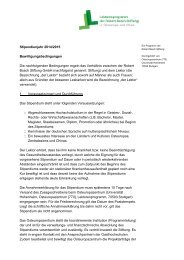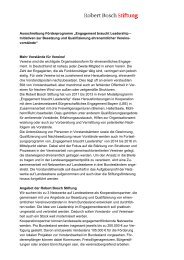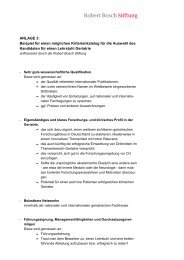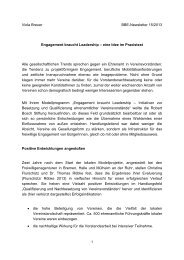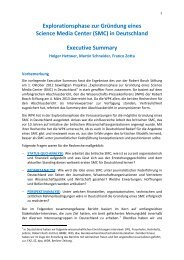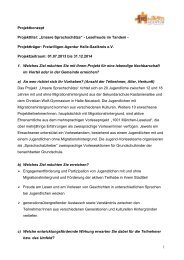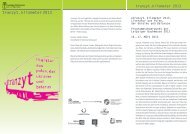Turkey, Its Neighbors and the West - Robert Bosch Stiftung
Turkey, Its Neighbors and the West - Robert Bosch Stiftung
Turkey, Its Neighbors and the West - Robert Bosch Stiftung
You also want an ePaper? Increase the reach of your titles
YUMPU automatically turns print PDFs into web optimized ePapers that Google loves.
t a b l e1<br />
GDP for <strong>Turkey</strong> <strong>and</strong><br />
<strong>Its</strong> Neighborhood in 2008<br />
All data for 2008 GDP per Capita GDP per Capita<br />
in PPP-$ as % of total avg.<br />
Greece 28470 244<br />
Cyprus 24040 206<br />
Russian Federation 15630 134<br />
<strong>Turkey</strong> 13770 118<br />
Romania 13500 116<br />
Bulgaria 11950 102<br />
Iran, Islamic Rep. 10840 93<br />
Azerbaijan 7770 66<br />
Ukraine 7210 62<br />
Armenia 6310 54<br />
Georgia 4850 42<br />
Syrian Arab Republic 4350 37<br />
Moldova 3210 27<br />
Iraq ..<br />
Average 11685 100<br />
Euro area 33228 284<br />
United States 46970 402<br />
All data for 2008 GDP GDP<br />
in billion $ USA = 100<br />
Russia 1608 11.3<br />
<strong>Turkey</strong> 794 5.6<br />
Iran 385 2.7<br />
Greece 357 2.5<br />
Romania 200 1.4<br />
Ukraine 180 1.3<br />
Syria 55 0.4<br />
Bulgaria 50 0.4<br />
Azerbaijan 46 0.3<br />
Cyprus 21 0.1<br />
Georgia 13 0.1<br />
Armenia 12 0.1<br />
Moldova 6 0.0<br />
Iraq ..<br />
Sum 3727 26.2<br />
US 14204 100<br />
Euro Area 13565 96<br />
Source: World Bank, Quick Query Data Source.<br />
(http://ddp-ext.worldbank.org/ext/DDPQQ/member.do?method=getMembers&userid=1&queryId=135)<br />
Economic Transformation <strong>and</strong> Human<br />
Mobility in <strong>Turkey</strong>’s Neighborhood<br />
C H A P T E R<br />
In <strong>Turkey</strong>’s neighborhood, <strong>the</strong> end of <strong>the</strong> Cold War coincided<br />
with <strong>the</strong> adoption of market economies <strong>and</strong> intensified<br />
globalization. The development of new telecommunication<br />
<strong>and</strong> information technologies, along with faster modes of<br />
transportation, has led to <strong>the</strong> increased flow of trade, capital<br />
<strong>and</strong> people across borders. Consequently <strong>Turkey</strong>’s external<br />
economic environment has changed significantly.<br />
To <strong>the</strong> north, <strong>the</strong> collapse of <strong>the</strong> soviet union led to <strong>the</strong><br />
emergence of new sovereign states entangled in transitioning<br />
from communist to market-oriented economies. for <strong>Turkey</strong>,<br />
<strong>the</strong>se countries represent important export markets, as well<br />
as a source of energy <strong>and</strong> cheap labor – ei<strong>the</strong>r as migrants<br />
to <strong>Turkey</strong> or as workers for foreign-based Turkish plants in<br />
<strong>the</strong> former soviet countries. To <strong>the</strong> west, <strong>the</strong> eu has grown<br />
geographically while extending its economic infrastructure<br />
<strong>and</strong> reach; in 1995 <strong>Turkey</strong> gained access to <strong>the</strong> eu market by<br />
signing a Customs union agreement. finally, <strong>the</strong> Middle east<br />
has become more important as a supplier of energy to <strong>Turkey</strong>,<br />
<strong>the</strong> eu, <strong>and</strong> beyond. unparalleled wealth from increased<br />
energy exports has transformed <strong>the</strong> region into a growing<br />
market for Turkish exports <strong>and</strong> investment.<br />
<strong>Turkey</strong>’s neighborhood is thus a rapidly growing economic<br />
marketplace. 1 The aggregated GDp of <strong>Turkey</strong> <strong>and</strong> its 13<br />
immediate neighbors has increased from less than 10<br />
percent of u.s. GDp in 2000 to more than 26 percent in<br />
2008. <strong>Turkey</strong> itself has grown by a staggering amount, from<br />
roughly 2 percent of u.s. GDp in 1970 to 5.6 percent by<br />
2008. It is clear that <strong>Turkey</strong> is a regional economic power<br />
in its immediate neighborhood; its GDp amounts to about<br />
one fifth of <strong>the</strong> entire region’s. <strong>Turkey</strong>’s GDp is half as big as<br />
russia’s, <strong>and</strong> twice that of Iran or Greece (see Table 1).<br />
an important but less publicized consequence of this<br />
economic change in <strong>Turkey</strong>’s neighborhood can be seen in<br />
new types of migratory flows in <strong>the</strong> region. <strong>Turkey</strong> has always<br />
been both a country of emigration – with large numbers of<br />
Turkish citizens emigrating to <strong>West</strong>ern europe to work, follow<br />
family, or seek asylum – as well as immigration – with more<br />
than 1.6 million migrants coming to <strong>Turkey</strong> (mostly from <strong>the</strong><br />
balkans) between 1923 <strong>and</strong> <strong>the</strong> mid-1990s. however, in <strong>the</strong><br />
last decade <strong>the</strong> scale <strong>and</strong> shape of movements of populations<br />
between <strong>Turkey</strong> <strong>and</strong> its neighborhood has transformed<br />
significantly.<br />
2<br />
9





